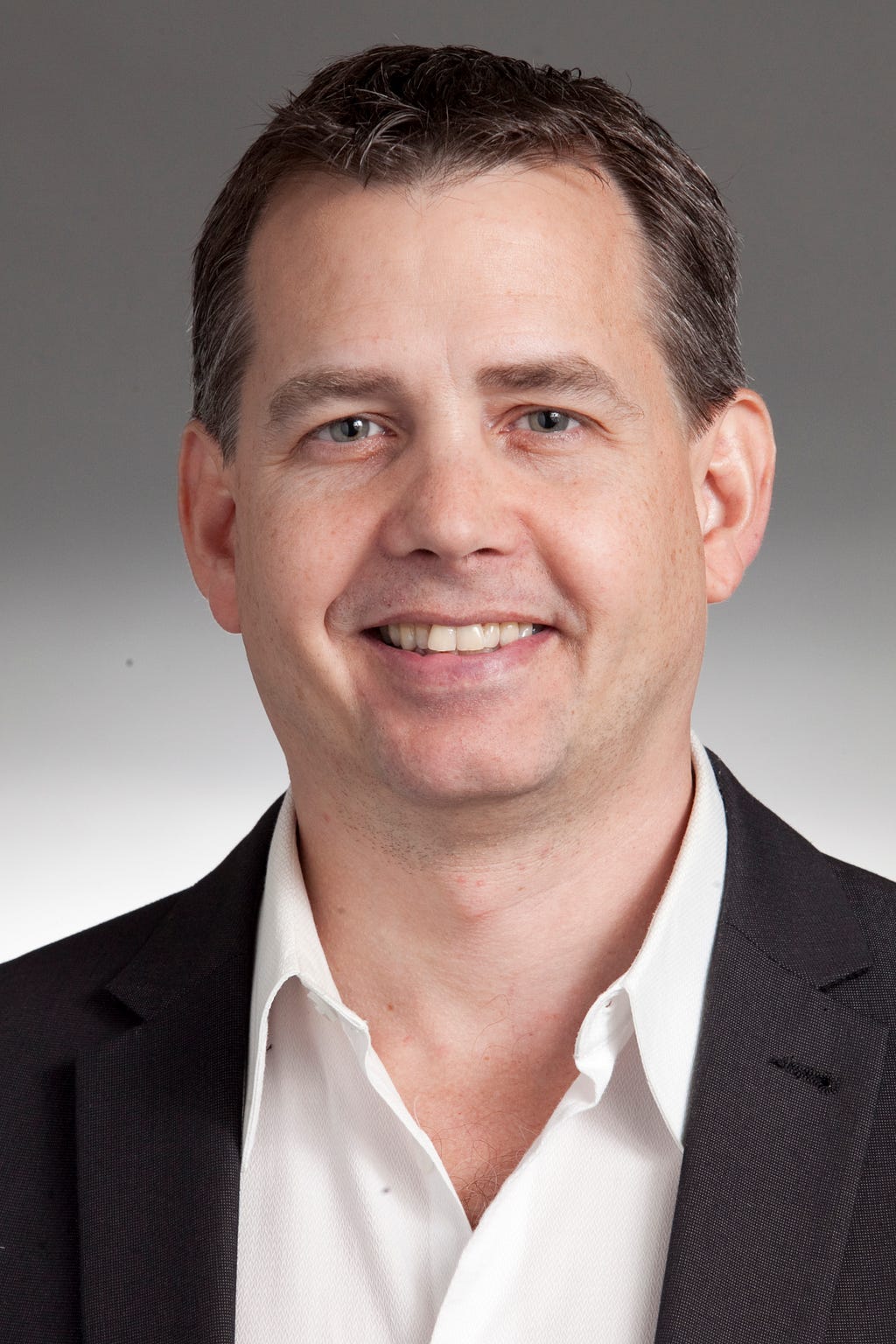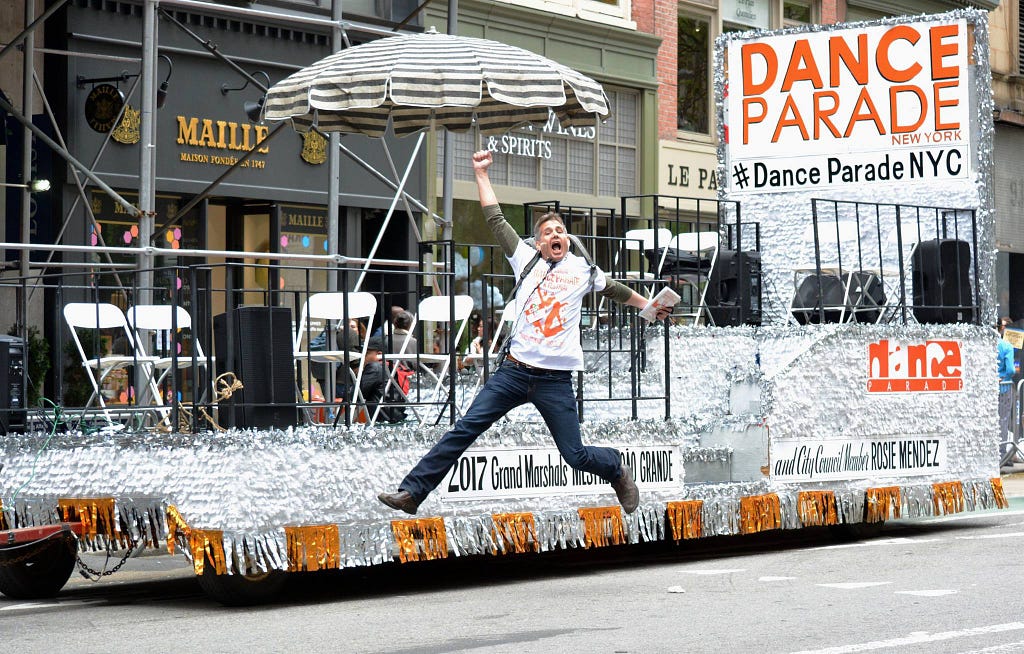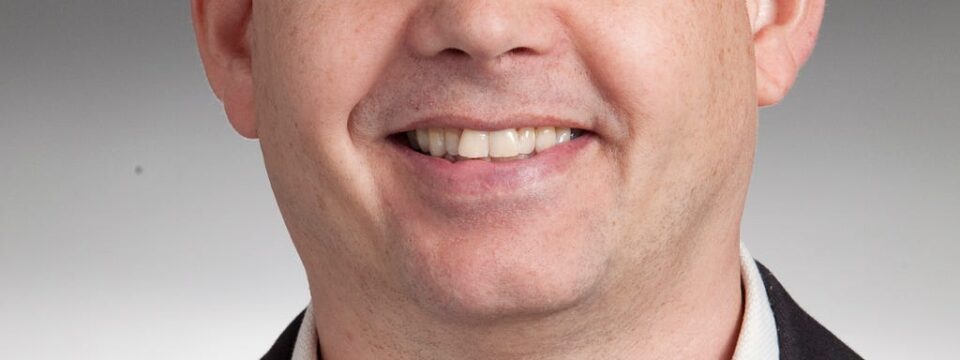
“Perfect” is the enemy of “Done” — with complicated things, sometimes you need to get it done fast and with certain core aspects in mind. Don’t wallow in the details that no one will care about. And don’t care about people judging you, just get things done to a minimal standard and move on!
As part of my series about “individuals and organizations making an important social impact”, I had the pleasure of interviewing Greg Miller.
After 18 years in NYC and around the world working for Fortune 500 companies, Greg Miller’s passion for dance took center stage. He founded Dance Parade in 2006, a non-profit celebrating all dance forms, bringing its energy to schools and community centers across NYC so that Community Engagement Programs end in NYC’s biggest dance event. A lifelong dancer (Cuban salsa aka Rueda, roller disco & 5Rhythms), Greg embodies the movement he champions, advocating for and fostering a vibrant and inclusive dance community.
Thank you so much for joining us in this interview series! Can you tell us a story about what brought you to this specific career path?
I used to enjoy going out in the Lower East Side and I got frustrated by seeing “no dancing” signs and being told I wasn’t allowed to dance. I teamed up with some advocates and we did dance protests against NYC’s prohibition era, racist and homophobic cabaret law. We organized a dance marathon near the State Supreme Court to garner attention to a 1st amendment case brought by dancers against the city. Before they ruled on it, I organized Dance Parade. Over 3 thousand people danced in the 1st Dance Parade and the rest was history!
Can you share the most interesting story that happened to you since you began leading your company or organization?
Back when we started protesting the anti-dance laws, there was a Cabaret Task force, also known as “Dance Police.” These were uniformed officers that went around fining and shutting down venues for illegal dancing. We protested by having Dance Police of our own. But our dance police ticketed people for NOT dancing. Then the ticket would instruct the violator to go to night court, with instructions on the reverse side of the citation which was a free coupon for a dance lesson or a pass to a dance party. But then we got a letter from the General Counsel of the NYPD. They asked us to “cease and desist” from using a modified NYPD shield and modified use of their NYPD logo (we were the “NYDP, the New York City Dance Police”). Our lawyer, Norman Siegel, the celebrated civil liberties lawyer, said that we should be allowed to do a parody of a known mark or logo. And the simple response was something like, “hmmm, uhhh, ok.”
It has been said that our mistakes can be our greatest teachers. Can you share a story about the funniest mistake you made when you were first starting? Can you tell us what lesson you learned from that?
When we started Dance Parade, I used to partner with a young Ivy League educated lawyer who had great parties. He convinced me that we could file the incorporation documents as a for-profit and then when or if we wanted to change that to a 501(c)3 nonprofit entity, a law firm could just have their interns file paperwork to alter it as a non-profit. At first we came up with calling our company, “The Metro Motion Parade” — we thought that was kinda cool but then we found out that we couldn’t switch over to a non-profit and needed a new name. A friend of mine said, just be simple, call it Dance Parade. What I learned was that you can’t always trust people because they went to a good school or were “in the industry” — If you’re doing something important, get an expert. And I’ve learned that when you’re working creatively on something, get multiple people to weigh in but don’t let the decision of something complicated (like a press release edit or something) be from a committee.
Can you describe how you or your organization is making a significant social impact?
With Dance Parade, we reach a broad audience and have the opportunity to shine the light on many emerging pre-professional and professional dance companies. We try to lift them up and support them by shooting a professional video of them at our Grand Stand in Astor Place and on our main stage at DanceFest in Tompkins Square Park. They then go on to use the videos for grant applications or for their marketing purposes. We also try to be as inclusive as possible by having American Sign Language Interpreters, information in various languages, and offer artist stipends to marginalized communities groups. We include artists with disabilities, people of color and young and old alike, getting dance in far corners of NYC. And the advocacy we do to gather a coalition of change makers has even changed laws to strengthen and benefit the NYC dance community as a whole.
Can you tell us a story about a particular individual who was impacted or helped by your cause?
Two individuals come to mind! Xianix Berrera had a float in our 2019 parade and presented her fabulous Flemenco group on our Main Stage after the parade. A few months later, the Bessie Awards committee, who specifically honors dance performers, gave her a Bessie Award.
At a Dance Parade Social event, we featured NYC Bhangra who gave performances and then a 20-something dancer named Stacy led the audience in a class. After the exhilarating class, Stacy expressed her immense gratitude to Dance Parade. Initially watching from the sidelines, she was captivated by the energy of the various groups. When NYC Bhangra came by, she snagged a flyer and decided to take a leap of faith. Completely smitten by Megha Kalia’s style and the spirit of Bhangra, Stacy dove headfirst into learning the dance. Within 6 months, she not only mastered the foundational Bhangra footwork but also tackled some advanced moves. Inspired by her progress, Stacy decided to share her passion by offering classes on Craigslist. Over time, her classes grew, and she’s built a significant following on social media. Stacy’s story exemplifies how Dance Parade can ignite a spark that leads to personal and artistic growth.
Are there three things the community/society/politicians can do to help you address the root of the problem you are trying to solve?
Yes, we ask people to:
- Sign the petition to adjust our restrictive NYC zoning laws on our advocacy website, legalizedance.org
- We ask folks to chip in what they can to support our artists in schools and in our annual events (the parade and festival). Donations can be made at dancepraade.org/donate
- The last one is the funnest one. Come out and DANCE in the 18th Annual Dance Parade and Festival happening May 18, 2024! You can choose any one of 128 groups. It might seem intimidating to dance in the streets but once you start, you realize that nobody cares what you look like and the public dance offers you an opportunity to express yourself artistically and energetically in a way that is very freeing. And that is the essence of our 2024 theme, “Dance Free NYC!”
How do you define “Leadership”? Can you explain what you mean or give an example?
For me, leadership is about creating a joyful and inclusive environment where everyone feels valued and empowered. It’s about setting clear goals and fostering accountability, but also recognizing the importance of fun and celebrating our differences. By leading by example, like letting loose on the dance floor, I hope to inspire a shared passion and commitment to Dance Parade’s mission.

What are your “5 things I wish someone told me when I first started” and why. Please share a story or example for each.
1 . I wish someone gave me a simple template to itemize and prioritize my main production, programming and marketing needs in the organization. The project management template I use doesn’t go into much detail and only has a project’s timeline from when it’s supposed to start to when it’s supposed to end, the priority and size of the project and importantly, who “owns” the project. A simple spreadsheet that your top 10 people on your team creates and maintains will lead to investment and ownership of various team members.
2 . “Fundraising is Friendraising” — Just having a non-profit organization or a cause isn’t enough to have people donate. I’ve learned that you need to have multiple personal appeals. Tell folks your accomplishments and why you need them to give.
3 . Grant writing is a ton of work and isn’t worth doing unless you have the time and resources to not only write a compelling grant application but to include professional video work samples, curriculum and program goals/details. Artists can start out by getting a “fiscal sponsor” to allow someone else’s non-profit bear the burden of having a board and being compliant with a million things but it’s worth starting out lean with a vision in order to grow. Also, partnering with groups who have secured grants before allows you both to benefit.
4 . Have different types of short meetings which are limited to 40 minutes each. Engaging with folks, letting them talk and allowing them to offer their views will create good “buy in” and that sense of “investment.” But keep meetings structured with 5 to 6 point agenda items, take notes and make action items.
5 . “Perfect” is the enemy of “Done” — with complicated things, sometimes you need to get it done fast and with certain core aspects in mind. Don’t wallow in the details that no one will care about. And don’t care about people judging you, just get things done to a minimal standard and move on!
6. A sixth… Respect everyone. Thank people frequently and genuinely whenever appropriate. It’s not hard to get lost in your own ego and agenda and it’s important to work with people in a way that’s not about me but about the organization’s collectively created mission and objectives.
You are a person of enormous influence. If you could inspire a movement that would bring the most amount of good to the most amount of people, what would that be? You never know what your idea can trigger. 🙂
I would have Mayor Adams create a campaign called, “The Big Hello: Building Bridges in Every Borough” which will strive to have everyone in the city learn 3 or 4 short sentences in a language they don’t know, Arabic, Hebrew, Farsi, Russian, Ukrainian, Spanish, Chinese… People can learn words from taxi drivers, waiters or bodega managers and then practice what they’ve learned over the course of months. It’ll be a free skill that can be acquired. The overall goal is to create more goodwill and respect among this city’s citizenry. This is a viable project because it doesn’t take long to learn a few words–and the people you speak to will be glad to have people at least try, bringing everyone together in a respectful, sisterly and brotherly way.
Can you please give us your favorite “Life Lesson Quote”? Can you share how that was relevant to you in your life?
“Ho’oponopono” is a Hawaiian prayer ritual to clear out one’s karma and conflicts. I learned to say it to the partner I’m in a relationship with and also use it in working relationships. Sometimes you’ve got to own the times you were less than graceful or the times you offended someone and simply say (english translation), “I’m sorry. Please forgive me. I love you. Thank you.” Pausing to say these things (in this specific order) keeps your ego in check, shows that you care and that you want to reconnect and move on.
Is there a person in the world, or in the US with whom you would like to have a private breakfast or lunch with, and why? He or she might just see this, especially if we tag them. 🙂
There are so many inspiring leaders, but for Dance Parade’s future, I’d love to connect with the head of programming at a local network like at Pix11 or with Helen Swenson at Spectrum News NY1. Each dance group in our parade has a powerful story — from ‘Moving for Life’ helping cancer survivors heal through dance, to ‘Full Circle Souljahs’, a hip-hop group with break dancers, to ‘Mazarte’ showcasing the rich cultural heritage of Mexico. Some people have a limited view of Mexico, often associating it with immigration issues or drug cartels. However, Dance Parade is proud to platform groups like Mazarte who share the incredible depth and beauty of Mexican culture. A local network spotlight would amplify these voices, inspire our community, and serve our city by increasing racial tolerance, cultural understanding, and appreciation. This can serve to create a communal human spirit and has the potential to build a more equitable and vibrant society.
How can our readers further follow your work online?
Head to danceparade.org to join, volunteer or donate to our causes. Get social with us with Dance Parade NYC on Instagram, Facebook, YouTube, X and TikTok!
This was very meaningful, thank you so much. We wish you only continued success in your great work!
Social Impact Heroes: Why & How Greg Miller Of Dance Parade Is Helping To Change Our World was originally published in Authority Magazine on Medium, where people are continuing the conversation by highlighting and responding to this story.
